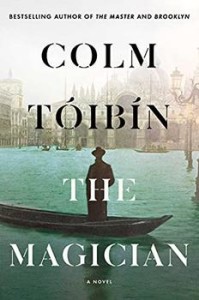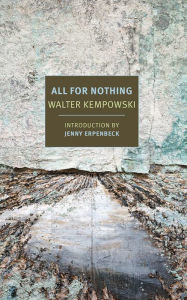
Tóibín has long been one of my favorite authors. This new story of the life and times of author Thomas Mann rises to an even higher level. Born in a provincial German town in 1875, Mann navigates his birth family’s dynamics, formed by his conservative and proper father and his lovely and unpredictable Brazilian mother. His much older brother Heinrich is the favored one, expected to become a famous writer, so Thomas keeps his own ambitions to himself. He must also hide his homosexual desires.
Thomas becomes the most famous writer of his time, author of novels such as Buddenbrooks, The Magic Mountain, and Death in Venice. Winner of the Nobel Prize, his private life remains secret. In captivating prose, Tóibín unravels these secrets, detailing the life of his family—his unruly children, his abiding marriage to Katia, daughter of a wealthy Jewish family—and the times in which they live—the Great War, the rise of Hitler, the Second World War, the Cold War.
Although written in close third person point of view, Tóibín adopts an authorial voice that conveys Mann’s personality: deliberate, insightful, alert to nuances of character. And each character in this story is multi-faceted, complex and contradictory, a combination of flaws and gifts.
What I love most is the way Tóibín enters the mind of Mann the writer, understanding the workings of inspiration, drudgery, and fame as only someone who has experienced it themselves can truly understand. For example, in one section, Thomas’s mind wanders as he listens to a performance of Beethoven’s Opus 132 quartet.
There were two men that he did not become and he might make a book from them if he could conjure up their spirits properly. One was himself without his talent, without his ambition, but with the same sensibility . . . A man, all conscience, who would have stayed in Germany even as Germany became barbaric, living a fearful life as an internal exile.
The other man was someone who did not know caution, whose imagination was as fiery and uncompromising as his sexual appetite, a many who destroyed those who loved him . . . A man who had been brushed by demons . . .
What would happen if these two men met? What energy would then emerge? What sort of book would that be? . . .
As the players drew near the final stretch, he felt the excitement of having been taken out of time and also a resolve that on this occasion the thoughts and ideas that came to him would mean something, would fill a space that he had been quietly creating.
Tóibín subtly gives us the experience of a writer’s children feeling abandoned in favor of the work, of friends and family feeling betrayed at his using details from their lives, of himself becoming a pawn in other people’s machinations.
I think this has become my new favorite book by Tóibín. Whether you are a fan of Thomas Mann’s writing or not, there is much to enjoy in this brilliant evocation of a writer’s life, of a German and part-Jewish family during this fraught period of history, and of the mysterious process of creation.
What is your favorite book by Colm Tóibín?
